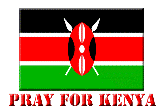We've met with a number of university students here, some of whom were very adamant that it was time for Kenyan politics to move beyond ethnic politics and community politics, that it was time for Kenyan politics to focus on national politics and ideological politics. Does Kenya need to have a more ideological base of party politics, rather than these coalitions of ethnic communities running against each other or alternating power?
I don't agree. It's a very simplistic view of Kenyan politics. Kenyan politics are much more complicated than that, and they are fairly ideological. ODM party [Odinga's party] is more of a social democracy [party]. PNU [Kibaki's party] is a more conservative political party. But ideology has even died in America. What is the difference between Republicans and the Democrats? Go to Britain. Labor and the Tories. It is not just only Africa. That is a very simplistic view of what's happening here.
Our politics are not ethnic. Look at elections last time. My party won seats in all the eight provinces in the country. Look at the presidential elections. I won the vote in six of the eight provinces. I did not win in [President Kibaki's province], but I also got some votes there. I did not win in Eastern Province, but I also got some votes there.
If you look at the Democrats and the Republicans in the United States when they are voting, there are some states that are purely Democratic, the others which are purely Republican. Your political parties are stronger in some regions than others. In Britain, there are what they called the Labor-safe seats and the Tory-safe seats. If you are a Labor and you want to run for a Tory-safe seat, they will give you a ticket, but not [funds], because they know you stand no chance of winning.
Tell me how ODM is an ethnic grouping. We have forty-two different tribes in this country. Who are my alliances in all those? Yesterday I was in Samburu [in northern Kenya], where I got 90 percent of the vote. Who are my ethnic allies in Samburu? In Somali, in Northeastern Province, I won the majority vote there. Who are my ethnic allies there? The people just voted for me because of what I represented. I got the votes of the Kambas [an ethnic group]; I got votes from [the coast]. I won the majority vote, not because of ethnic alliances, but because of what my political party stood for. This idea that politics in Africa is ethnic-based tribalism completely misses the point. It does not understand the sophistication of African [politics].
You have made some public statements of frustration and exasperation with the government and threatened at points to pull out. First, do you have any intention of doing so, and under what conditions?
I have not threatened to pull out. We will not pull out because pulling out would amount to surrender. Our position is that we won an election but our victory was stolen. We agreed to compromise so that the country can move on and that we use this position to produce reforms that will ensure this country does not in this future get itself in the difficult situation that it found itself in last year.
We want to devolve power to give the regions more say in planning and execution of the development agenda. We want parliament to play an oversight role and the executive to implement the vision.
What we have been doing sometimes is to criticize from within so that we can act as a catalyst to the process of reforms. There are difficult areas where the two sides of the coalition are not in agreement. For example, the issue of police reform. Also in the area of judicial reform.
In a coalition, it is not always the case that two sides will agree. Sometimes there are different positions. That's how coalitions work the world over. Even in Germany, where they have a grand coalition, sometimes you see that the coalition partners disagree.
Quotes from Prime Minister says Kenyan politics are not ethnicRelated article:
Did the government change its report in Geneva




